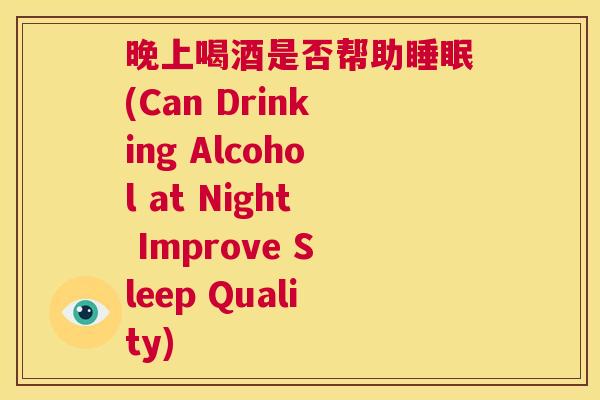晚上喝酒是否帮助睡眠(Can Drinking Alcohol at Night Improve Sleep Quality)
Introduction
Many people have turned to alcohol as a means of inducing sleep after a long and stressful day. It's a common belief that a nightcap can help relax the mind and body, leading to better sleep quality. However, the relationship between alcohol consumption and sleep is more complex than it may seem at first glance.
The Effects of Alcohol on Sleep

While alcohol can initially make you feel drowsy and may help you fall asleep faster, its overall impact on sleep quality is often negative. Research has shown that alcohol disrupts the natural sleep cycle, leading to fragmented and less restorative sleep. As alcohol is metabolized by the body, it can cause disturbances in various stages of sleep, including reducing REM (rapid eye movement) sleep, which is crucial for cognitive function and memory consolidation.
Alcohol and Sleep Architecture
Alcohol affects the architecture of sleep by altering the balance between different sleep stages. While it may promote deeper sleep in the early part of the night, it tends to lead to more frequent awakenings and lighter sleep in the latter part of the night. This disruption in sleep architecture can result in feelings of grogginess and fatigue the next day, even if you've spent an adequate amount of time in bed.
Alcohol and Sleep Disorders
For individuals with pre-existing sleep disorders such as insomnia or sleep apnea, alcohol can exacerbate these conditions. While it may initially seem to alleviate symptoms, it can ultimately worsen sleep quality and lead to more severe disruptions. Moreover, regular alcohol consumption can contribute to the development of sleep disorders over time, creating a vicious cycle of poor sleep and increased alcohol reliance.
Alcohol's Impact on Sleep Quality
Although alcohol can make you feel sleepy initially, it often leads to poorer overall sleep quality. Studies have consistently shown that alcohol consumption before bed is associated with increased awakenings during the night, decreased REM sleep, and overall less restorative sleep. These effects can have long-term consequences for both physical and mental health.
Alternative Strategies for Better Sleep
Instead of relying on alcohol to help you sleep, there are several healthier alternatives that can promote better sleep hygiene. Establishing a consistent bedtime routine, creating a comfortable sleep environment, and practicing relaxation techniques such as meditation or deep breathing can all contribute to improved sleep quality. Additionally, avoiding caffeine and electronic devices before bed and engaging in regular exercise can help regulate your sleep-wake cycle naturally.
Conclusion
While alcohol may seem like a quick fix for sleep problems, its overall impact on sleep quality is negative. Instead of turning to alcohol, it's important to address underlying issues that may be contributing to poor sleep and adopt healthier sleep habits. By making lifestyle changes and prioritizing good sleep hygiene, you can achieve more restful and rejuvenating sleep without relying on alcohol.






